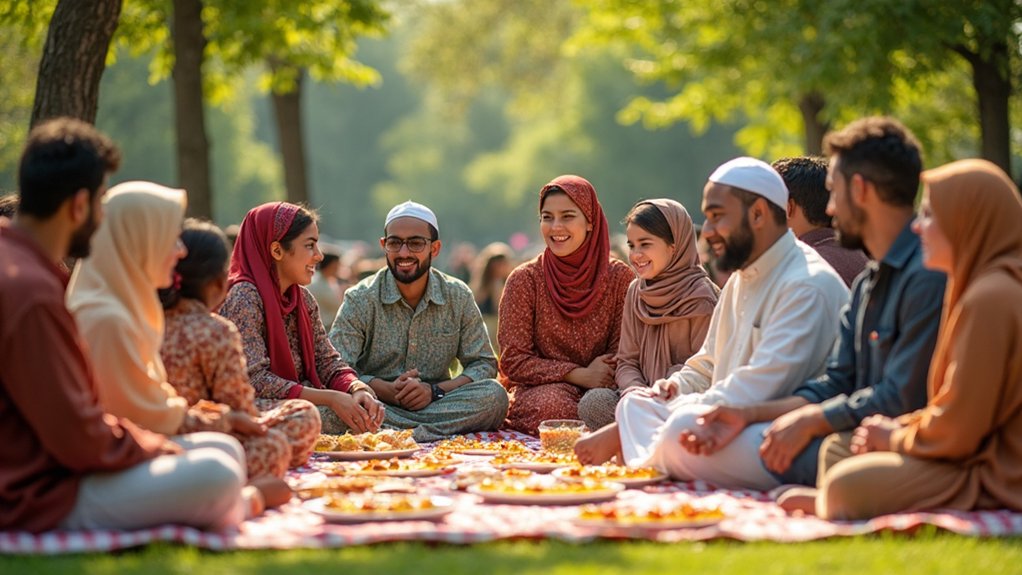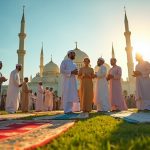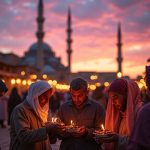
What is the meaning of Hijab in Islam
Uncover the profound meanings behind the hijab in Islam and discover why it holds such significance in a Muslim's life.


When do Muslims celebrate Eid Al-Fitr? The date of Eid Al-Fitr depends on the sighting of the new moon, which means the exact day can vary by country and region. Muslims celebrate Eid Al-Fitr at the end of Ramadan, but since the lunar calendar is used, the timing is confirmed only when the new moon is seen.

This creates a sense of excitement as communities around the world await the announcement of Eid Al-Fitr. Local traditions and the timing of the moon sighting both play important roles in how and when Muslims celebrate Eid Al-Fitr each year.
Eid Al-Fitr is a joyful celebration that takes place at the end of Ramadan, the month of fasting for Muslims around the world.
Eid Al-Fitr is a time when families and friends come together to share special meals, exchange gifts, and give thanks for the blessings they’ve received.
This important festival isn’t just about celebration; Eid Al-Fitr also encourages acts of charity, forgiveness, and kindness to others, especially the less fortunate.
The Islamic calendar is a lunar-based system that plays a crucial role in the Islamic faith. Unlike the Gregorian calendar, the Islamic calendar consists of twelve lunar months, each beginning with the sighting of the new moon.
This unique approach means that Islamic calendar dates shift each year in relation to the Gregorian calendar. Understanding the Islamic calendar is essential for recognizing when major religious events and celebrations, such as Eid Al-Fitr, take place.
The significance of moon sighting holds a special place in the Islamic tradition.
The significance of moon sighting is especially important for marking the beginning of Ramadan and Eid Al-Fitr, two of the most celebrated events in Islam.
By participating in the significance of moon sighting, Muslims connect with a rich heritage, fostering unity and a sense of community.
Watching for the new moon brings anticipation and shared joy, making the significance of moon sighting a meaningful and memorable part of Islamic practice.
The date of Eid Al-Fitr is determined by the sighting of the new moon, which marks the end of Ramadan. Local mosques and Islamic councils play a key role in announcing when the new moon has been sighted, helping communities know exactly when Eid Al-Fitr will be celebrated.
If the new moon is seen, Eid Al-Fitr is observed the next day; if not, the celebration is postponed by a day. This traditional method ensures that the date of Eid Al-Fitr is closely tied to the lunar calendar, bringing families and communities together for a meaningful and synchronized celebration.
Eid Al-Fitr celebrations showcase vibrant regional variations, making the holiday a unique experience around the world.
These regional variations are reflected in how different communities mark the occasion. For example, some regions celebrate Eid Al-Fitr with lively parades and dazzling fireworks, adding excitement to the festivities.
In other places, regional variations mean that families gather for special feasts and join in heartfelt communal prayers. Across Asia, you’ll find regional variations in the form of unique traditional dishes, while in the Middle East, elaborate decorations and meaningful gifts are part of the celebration.
No matter where you are, these regional variations bring a special flavor to Eid Al-Fitr, highlighting the rich cultural diversity of this joyous holiday.
Local mosques play a vital role in the Eid Al-Fitr celebrations, acting as central gathering places for the community.
During Eid Al-Fitr, local mosques organize special prayer services, welcome families for communal meals, and lead charitable activities to help those in need.
By visiting your local mosque for Eid Al-Fitr, you can connect with your community, join in the festivities, and create lasting memories with fellow worshippers.
Participating in activities at your local mosque during Eid Al-Fitr helps make the celebration more meaningful and strengthens your bonds with others.
Eid Al-Fitr is celebrated with a variety of cultural practices that make this holiday truly special.
Across the world, families come together during Eid Al-Fitr to prepare delicious traditional meals, wear new or festive clothes, and exchange thoughtful gifts.
Many communities decorate their homes with colorful ornaments and play lively music to mark the joyous occasion of Eid Al-Fitr.
These cultural practices not only enhance the spirit of the holiday but also bring people together in gratitude and unity, making Eid Al-Fitr a memorable celebration for everyone involved.
The importance of community and family shines brightly during Eid Al-Fitr. Celebrating Eid Al-Fitr with loved ones strengthens the bonds between family members and brings the entire community closer together.
Sharing delicious meals, exchanging gifts, and enjoying traditional activities are all part of the importance of community and family during Eid Al-Fitr. These special moments not only create lasting memories but also foster a sense of unity and belonging.
Embracing the importance of community and family makes Eid Al-Fitr a truly joyful and meaningful celebration for everyone.
Celebrating Eid Al-Fitr is a special time when families and friends gather to enjoy meaningful moments together.
Sharing Eid Al-Fitr greetings is a wonderful way to spread happiness and strengthen bonds. Common Eid Al-Fitr greetings like “Eid Mubarak” wish everyone a blessed and joyful celebration, while phrases such as “Taqabbal Allah” convey hope for accepted prayers.
Using these heartfelt Eid Al-Fitr greetings helps create a sense of unity, making the festive occasion even more memorable for everyone involved.
Eid Al-Fitr is a joyful celebration filled with meaningful activities and cherished traditions. On Eid Al-Fitr, families and friends come together to start the day with a special prayer, marking the significance of this festive occasion.
One of the key traditions of Eid Al-Fitr is sharing delicious meals and sweets, bringing everyone closer. Another important aspect of Eid Al-Fitr is giving zakat, or charity, to those in need, spreading kindness and generosity.
Exchanging gifts and visiting loved ones are also common traditions during Eid Al-Fitr, helping create lasting memories and a true spirit of togetherness. Celebrate Eid Al-Fitr with these heartwarming customs and make the most of this special holiday.
Eid Al-Fitr is a major holiday for Muslims around the world, celebrated at the end of the holy month of Ramadan. But what date do Muslims celebrate Eid Al-Fitr? Unlike many holidays with fixed dates, the date of Eid Al-Fitr changes each year because it is determined by the sighting of the new moon. This means that the answer to “what date do Muslims celebrate Eid Al-Fitr?” can vary depending on where you are in the world and local moon sightings.
Knowing what date do Muslims celebrate Eid Al-Fitr is important for those who want to join in the festivities, connect with family and friends, and experience the unique cultural traditions that make this day so special. Whether you are celebrating or simply want to understand more about this important occasion, marking the date of Eid Al-Fitr on your calendar helps you share in the joy and unity of Muslim communities everywhere.

Uncover the profound meanings behind the hijab in Islam and discover why it holds such significance in a Muslim's life.

In understanding why Eid Al-Fitr is important in Islam, one uncovers a tapestry of traditions, gratitude, and community that beckons deeper exploration.

Join us as we uncover the intriguing duration of Eid Al-Fitr celebrations and the unique traditions that make this holiday so special.

Motivations behind Muslim women wearing hijab vary widely, blending faith, culture, and empowerment; discover what truly drives these profound choices.

Muslim women must navigate modesty in fashion; discover five clothing types that could compromise your values and confidence. Will your wardrobe make the cut?

Knowing the historical roots of Ramadan reveals profound transformations in the Muslim community—what events ignited this sacred month?